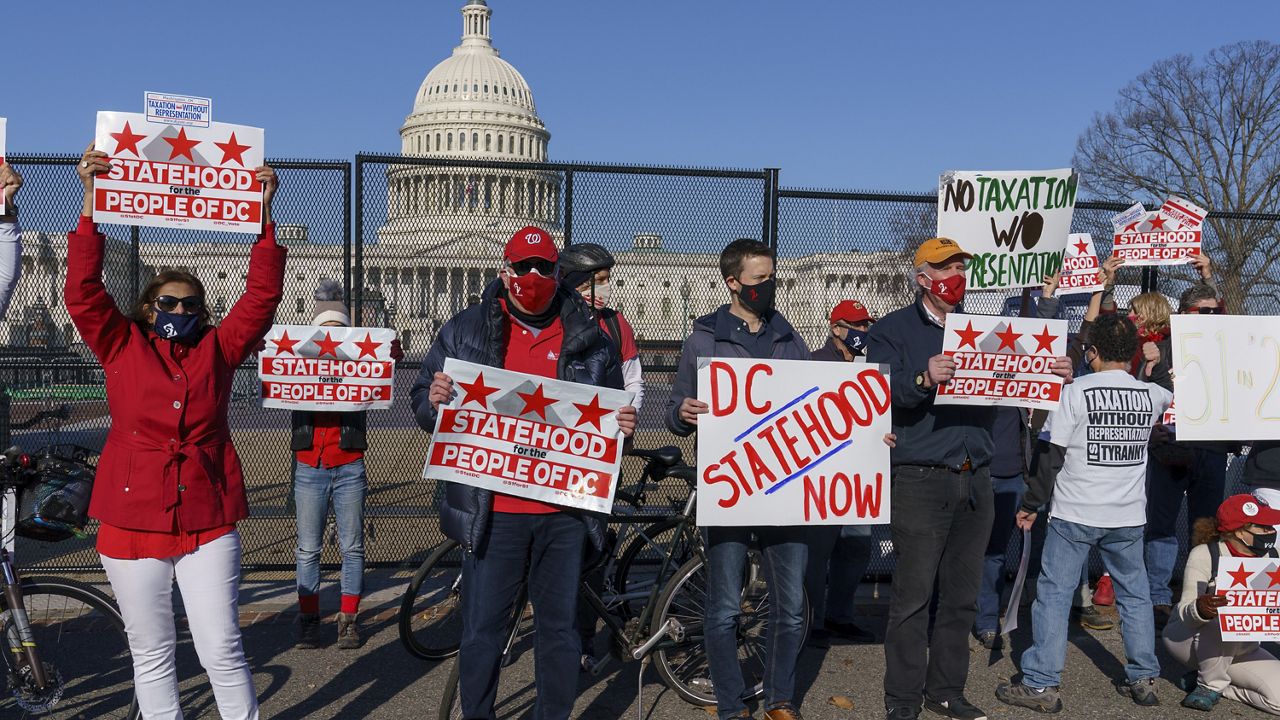The House of Representatives voted Thursday to make Washington, D.C., the 51st state.
Despite the uphill battle that the measure will almost certainly face in the evenly divided Senate, statehood advocates call the moment a milestone for equality and representation.
The final vote was 216-208 along party lines. The bill now heads to the 50-50 Senate.
“My service in the Congress has been dedicated to achieving equality for the people I represent, which only statehood can provide,” Eleanor Holmes Norton, D.C.’s nonvoting representative in the House, said at a Wednesday news conference. “My life as a third-generation Washingtonian has marched toward this milestone.”
House Speaker Nancy Pelosi (D-CA) called Norton, who introduced the statehood bill and has served in her role since 1991, the “patron saint of D.C. statehood.”
"With HR 51, Congress is taking a significant step to enfranchise the people of DC and empower them to participate fully in our democracy," Pelosi said on Wednesday. "Again, we're excited that we will pass it. We will celebrate, and we hope that momentum will help it pass in the Senate so that the President can sign it into law.”
Pelosi added that the vote would “reaffirm the truth that all deserve a voice in our democracy.”
The bill would create the new state of Washington, Douglass Commonwealth, granting D.C.’s roughly 700,000 citizens full representation in Congress, with two Senators and one member in the House with full voting privileges, as well as authority over local issues. The bill would shrink the federal district to a small, two-square-mile sliver of land, which includes the White House, the U.S. Capitol and the National Mall.
An identical bill passed the House in 2020 with a 232-180 vote, but was killed in the Republican-controlled Senate.
Currently, D.C.’s residents are subject to federal taxes — with the slogan “End Taxation Without Representation,” an echo of the slogan that started the American Revolution, emblazoned on the district’s license plates — and have no representative in Congress, though they do have the right to vote in presidential elections.
The District has a population larger than that of two U.S. states — Vermont and Wyoming — and all of the United States’ territories other than Puerto Rico.
The measure has the staunch backing of the Biden White House, which issued a statement of support this week, labeling Washington’s status as “an affront to the democratic values on which our Nation was founded.”
“Washington, D.C. has a robust economy, a rich culture, and a diverse population of Americans from all walks of life who are entitled to full and equal participation in our democracy,” the Biden Administration continued.
But Republicans are sure to staunchly oppose the measure, given the voting demographics of D.C.
Since 2000, the district has voted for Democrats in presidential elections over 85% of the time, peaking in 2008 at 92.5% for Barack Obama. Washington, D.C., supported Joe Biden over Donald Trump by a margin of 92% to 5% in 2020.
In a March hearing before the House Oversight and Reform Committee, Republicans blasted the measure as a Democratic power grab.
Rep. James Comer (R-KY), the ranking member of the committee, called the bill "Plan B of the Democrat political power grab," alleging that "Plan A" is abolishing the legislative filibuster in the Senate.
"D.C. statehood is a key part of the radical leftist agenda to reshape America, along with the Green New Deal, defunding the police and packing the U.S. Supreme Court," Comer added opening remarks.
Opponents have proposed alternatives, including absolving residents of federal taxes, or the retrocession of much of D.C. back into neighboring Maryland. In February, Norton said in a statement that a motion to retrocede D.C. into Maryland “demonstrates Republican fear of the momentum our D.C. statehood bill is rapidly achieving.”
The limitations of D.C.’s reality were put in stark relief last summer during a series of angry protests over the death of George Floyd in Minneapolis in police custody and against general police brutality. After a night of widespread vandalism, President Donald Trump usurped D.C. Mayor Muriel Bowser’s authority and called in a massive multiagency federal force to downtown. The law enforcement forces cleared peaceful protesters from a public street so Trump could pose for a photo outside a church.
Calls for statehood have only grown since the U.S. Capitol riot by a pro-Trump mob on Jan. 6, which left 5 dead. The city had no power to activate the National Guard to quell the riot.
"The mayor of D.C. cannot deploy the D.C. National Guard case in of emergency, like the insurrection we saw just two months ago in our nation's Capitol that resulted in the death of police officers and dozens of injuries," Delaware Sen. Tom Carper, one of the bill's cosponsors, said before the March hearing. “This is not just a question of democracy or taxes, it's also a question of public safety.”
